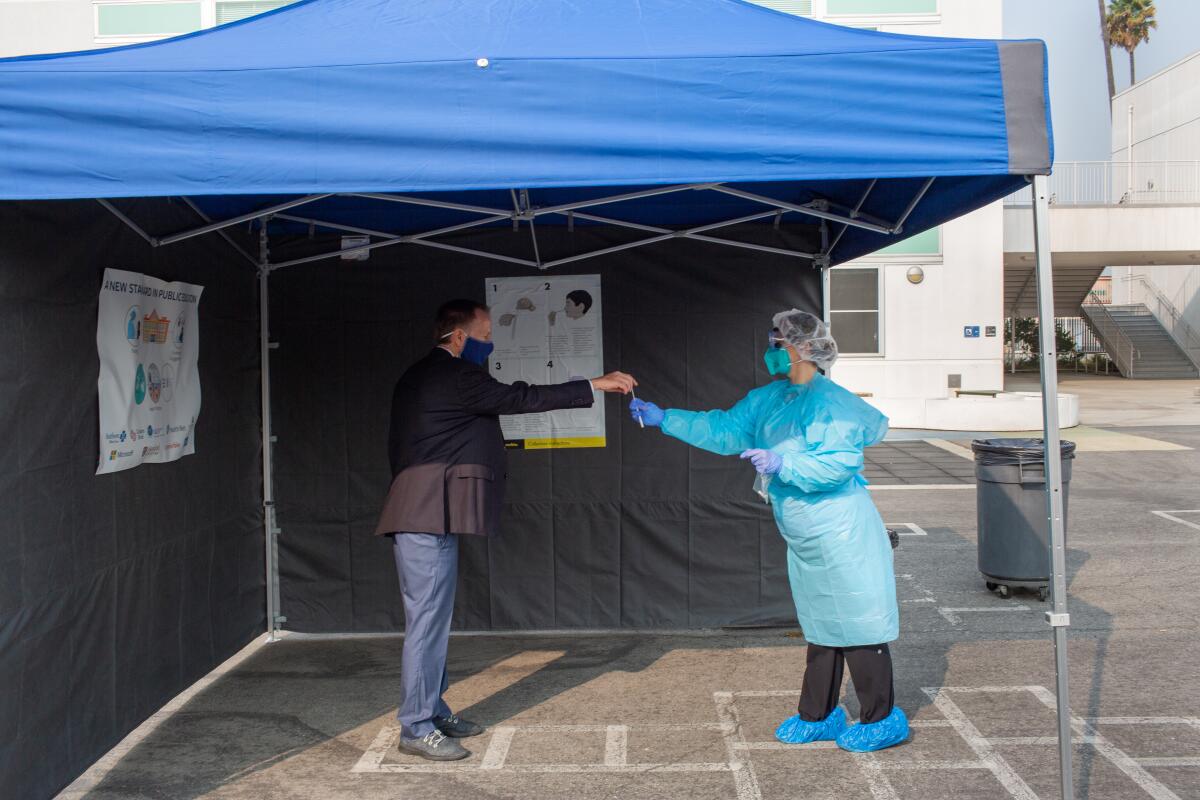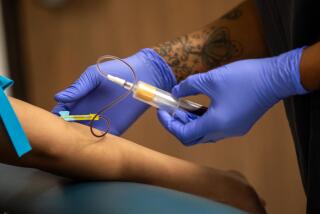L.A. Unified’s high-stakes bet that untested start-up can run its coronavirus testing program

- Share via
Los Angeles schools Supt. Austin Beutner had a problem. He was firm in his stance that reopening schools safely during the COVID-19 pandemic would depend on rapid, extensive coronavirus testing. But no city, county or state program was available to provide or pay for it at the scale he thinks is needed in the nation’s second-largest school district.
So he chose the company of a former business partner, Sky Dayton, who helped him put together an audacious plan: The Los Angeles Unified School District would carry out its own testing, the largest such district-led initiative in the country.
For the record:
4:34 p.m. Oct. 1, 2020A previous version of this article incorrectly said testing lab SummerBio had an undisclosed location. The company added a map pin to its website on Sept. 25.
Beutner approved a $48.9-million contract with Dayton’s new company, SummerBio, using emergency powers he has invoked since March because of the pandemic.
The district’s regular, often lengthy procurement process typically involves a formal request for proposals and traditional competitive bidding. But at the start of the pandemic, the Los Angeles school board set aside customary guardrails to give Beutner the ability to act quickly — powers he has exercised repeatedly, including in efforts to distribute meals and purchase computers and Wi-Fi hot spots.
This effort could end up being a major test of whether Beutner — whose background is in business rather than education — can deliver results to the sprawling district.
Dayton, the founder of EarthLink and Boingo, made a fortune in technology start-ups. But his background for medical testing is thinner. Nonetheless, Dayton reached out to Beutner in May, the schools chief said, pledging to deliver machine-automated coronavirus testing that would drastically drive down the cost.
“We have to do something different because the [other] choice for us was to say, ‘All right, I’ll wait for someone else to do it,’” Beutner said Wednesday. “That wasn’t happening.”
“We knew they were building a real company,” Beutner said. “Part of our due diligence was to understand who would be in charge,” he said, referring to Dayton and Guido Baechler, who was named SummerBio’s chief executive in August but was associated with the project earlier. Baechler formerly ran a medical testing company.
Beutner said SummerBio’s discount pricing, which was far less expensive than other firms being evaluated, ultimately made the project feasible.
L.A. school board President Richard Vladovic said that the board is regularly briefed in general terms on the progress of the testing effort and that he wasn’t aware of any potential concerns with SummerBio. He added that Beutner brings business experience and connections that are helpful in the current crisis.
“He can sit down with knowledge with CEOs of lots of companies,” Vladovic said. “I’m convinced he’s looking out for the interests of the students and the district. He got us a good deal, and I think that’s one way to open schools.”
Several district insiders, speaking on the condition of anonymity, have expressed nervousness about operating outside the normal contracting process — which would have been unlikely to yield Menlo Park-based SummerBio, a company with no track record that was hurriedly hiring employees.
The fledgling company has a mail drop at a UPS store for its official address in state records. Until Friday, when a pin drop map was added, the company’s website did not identity its location. The web update included video of Beutner describing the testing effort.
SummerBio’s Aug. 14 contract with L.A. Unified, which the district released to The Times on Wednesday, states that the company “has not received an Emergency Use Authorization” issued by the U.S. Food and Drug Administration for the tests. That could normally create legal hurdles for the company’s ability to operate, but during the pandemic emergency, the company can do business legally by submitting an application for authorization. The company submitted its application Aug. 7, according to the contract.
In the middle of a hiring spree, SummerBio listed 16 openings on LinkedIn last week, including postings for four scientists, a data manager, a senior automation control engineer and a biostatistician.
Beutner noted that SummerBio is using an established, FDA-approved test kit. What’s new, he said, is the engineering that allows for faster and less expensive processing. If the results arrive too slowly or are unreliable, the district doesn’t have to pay for those particular tests. Given that, Beutner said, the contract is worth the calculated risk of going with a start-up.
The district has received hundreds of millions of dollars in coronavirus relief funds and intends to use that funding to pay for the testing, although it has argued that it should not have to pick up the full costs from those dollars.
Under the contract, L.A. Unified is to get next-day, early morning results for up to 40,000 daily tests, at a price that no one else can match, Beutner said. The first 475,000 tests are $20 apiece, and the price drops gradually based on volume. Tests purchased after the 2-million mark drop to $10 apiece, which the contract schedule estimates to happen in February.
Quality tests elsewhere range higher. By comparison, the well-regarded Broad Institute in Cambridge, Mass., has developed an automated procedure that has allowed it to reduce what it charges to schools and colleges, who are paying about $35 to $50 per test.
The periodic testing is supposed to encompass all K-12, preschool and adult school students as well as some 75,000 employees — a total surpassing 700,000 people — as well as immediate family members as needed.
Inevitably, “risk-taking is going to be part of the solution,” said Peter Kuhn, a professor of biology, medicine and engineering at USC. Kuhn noted that efforts to close the testing gap are coming from academic centers, existing companies that were able to adapt to a new role and “rapid-fire start-ups financed by individuals and groups who wanted to be part of the solution.”
Ideally, he said, these kinds of transactions would occur in a fully transparent way, “but everybody is moving so fast.”
Dayton is well known for entrepreneurial ventures involving the internet. He was an early provider of dial-up internet service as EarthLink‘s founder. Later, he founded Boingo, which is known for providing internet service at airports.
More recently, he’s been an active investor and board member in Joby Aviation, which is designing electric short-hop mini-planes that would provide taxi service, and a leading investor in Swarm Technologies, which specializes in launching satellites as small as a sandwich. In 2018, Swarm agreed to pay a $900,000 fine to the Federal Communications Commission for launching four tiny satellites without the agency’s permission. Dayton also has a major stake in Age of Learning, an online education platform for children.
Beutner served on the board of EarthLink when Dayton headed the company, according to federal regulatory disclosure documents from 2001. Around that time, a trade publication noted that he and Dayton were business associates in eCompanies-Evercore Venture Management through Evercore, the investment company that Beutner headed at the time. Evercore also became a key investor in Boingo.
In 2011, Dayton co-hosted a fundraiser for Beutner’s short-lived run for mayor of Los Angeles.
Beutner said it’s been about 15 years since he’s had a business association with Dayton, whom he described as “just someone I know.”
When Dayton came to him with the testing proposition around May, SummerBio also was contacting other potential customers, Beutner said. Over the summer, a team at L.A. Unified, which included outside advisors and experts, evaluated the testing services and prices of 22 companies — per a list provided by the district. The offer nearest to SummerBio was four times as expensive, according to the district.
It was far from a given that SummerBio would get the work, said Beutner, adding that SummerBio has delivered so far. At this juncture, the number of daily tests needed is well below what the district will soon be seeking. The company uses its own pilot to fly tests to the San Francisco Bay Area twice a day for processing.
SummerBio was incorporated May 26 in Delaware, a common place for corporate filings. The company was registered in California on June 3. Two apparently related entities were incorporated in Delaware on Aug. 14 (SummerBio Management Holdco) and Aug. 21 (Summer Bio Holdings) — a week after Beutner announced the partnership. Documents filed with state regulators are signed by Dayton, who lists himself as “manager.”
Baechler, the CEO, was officially hired in August, according to his LinkedIn profile, but Beutner said Baechler was part of the project well before that. According to the profile, Baechler serves on the board of two biotech companies and recently founded a medical technology consulting firm.
For six years, until 2019, he headed Singulex, a Silicon Valley medical testing company. In June 2019, the 71-employee company reported to the state that it was closing permanently before the end of the month. The company’s website is no longer active.
Beutner said it’s his understanding that L.A. Unified is SummerBio’s first and only customer but that the company has fielded many recent inquiries about its “$10 test.”
SummerBio referred all inquiries to L.A. Unified. Dayton could not be reached for comment.
Outside experts said many projects have gone into overdrive during the pandemic.
“It would not be completely unreasonable for a company to start in a matter of months, especially as many biotech or laboratory companies have recently shifted gears to COVID testing during the pandemic,” said Richard Dang, assistant professor of clinical pharmacy at USC. “I do think that the lack of transparency from the company is somewhat of a red flag.”
Dang called the $10 test “an incredibly low amount that I have yet to see elsewhere.”
Even at the comparatively low prices, the school district projects its testing plan to run more than $150 million this year, when all costs are factored in.
Collaborators on the effort include experts from three universities — UCLA, Johns Hopkins and Stanford — and Microsoft, which is designing an app linked to the testing effort.
Because of high infection rates in L.A. County, schools cannot fully reopen until late October at the earliest.
More to Read
Sign up for Essential California
The most important California stories and recommendations in your inbox every morning.
You may occasionally receive promotional content from the Los Angeles Times.











